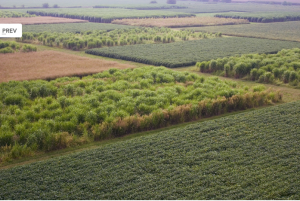According to a new study from Colorado State University (CSU) in collaboration with the University of Illinois, using grasses to produce biofuels is a more economical and environmental better option than using corn. Led by CSU research scientist William Parton, his research team found using grass species, such as switchgrass, in the same land area as used to grow corn (the Midwest Corn Belt) could result in an increase in ethanol production, a decrease in nitrogen leaching (Dead Zone) and a reduction in greenhouse gas emissions.
Furthermore, the research concluded that replacing corn with perennial grasses could increase the productivity of food and fuel within the region without causing additional indirect land use changes. The study was published in the online version of Frontiers in Ecology and the Environment.
 “Raising perennial biofuel crops on previously cultivated land in the United States will result in massive reductions in greenhouse gas fluxes from agricultural systems,” said Parton. “Growing perennial biofuel crops on low-production agricultural land can result in large environmental benefits such as improved air and water quality as well as increased ethanol production and sustained production of corn and soybeans.”
“Raising perennial biofuel crops on previously cultivated land in the United States will result in massive reductions in greenhouse gas fluxes from agricultural systems,” said Parton. “Growing perennial biofuel crops on low-production agricultural land can result in large environmental benefits such as improved air and water quality as well as increased ethanol production and sustained production of corn and soybeans.”
Parton said the research supports additional efforts in studying methods of producing ethanol from biomass crops, and despite the fact that biomass to ethanol is not currently economical, biomass crops have the potential to benefit the Corn Belt in ways corn cannot.
“We have found that perennial biofuel crop growth has the potential to reduce greenhouse gas fluxes and nitrogen leaching from agricultural systems while maintaining current food production for human consumption,” continued Parton. “Production of corn-based ethanol simply cannot compare to the 15 percent to 30 percent reduction in nitrogen leaching into the Gulf of Mexico when perennial crops are grown for ethanol production.”

